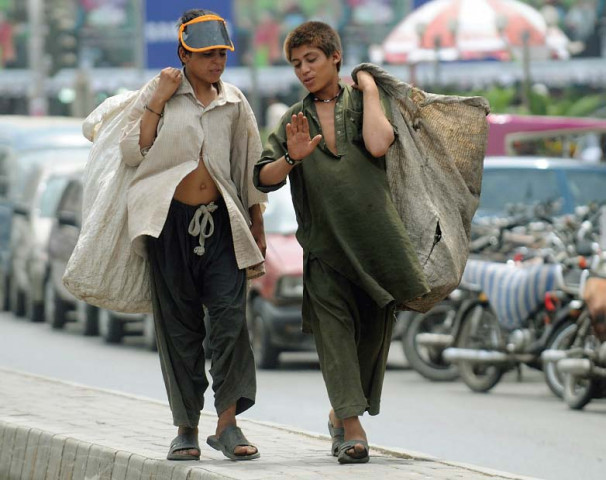Ragpickers exposed to serious health hazards in capital
IMC Sanitation Director said the garbage collectors do not wear gloves and masks as per their own choice

PHOTOS: AFP
Rag-pickers are mostly at risk to contract diarrhea, typhoid, paratyphoid and health complications related to liver, stomach and intestine due to bacterial contamination, Pakistan Institute of Medical Sciences (PIMS) spokesman Dr Waseem Khawajah said.
He said the scavengers were picking household garbage from dumpsters, waste heaps and even nullahs which increases their vulnerability to catch harmful diseases if they continue to eat and drink with those hands.
"They should wear proper uniform, masks and safety gloves to avoid direct contact with household waste and properly wash hands with sanitizers and hand wash that are easy to carry and use," he added.
Islamabad Metropolitan Corporation (IMC) Sanitation Director Sardar Khan Zimri said the garbage collecting sanitary workers have proper kits, but they do not wear gloves and masks as per their own choice. "Most of the scavengers working privately are Afghan and are illegally working in the sector and do not fall in our jurisdiction,” Zimri said.
IMC cannot ask scavengers to wear safety gloves and masks to protect them from negotiating infectious diseases. The waste being collected by rag-pickers is only household waste whereas a strict implementation of hospital waste management has been ensured through Environmental Protection Agency (EPA) and there is no open dumping of hospital waste, he said.
Zimri said IMC could impose fine of Rs50,000 to Rs1,00,000 on violation to the hospital staff on poorly managing the waste disposal. The fine to be imposed depends upon the level of violation made in this regard.
In a recent report on Plastic Waste Baseline Study of Islamabad Capital Territory (ICT) and Ayubia National Park (ANP) jointly launched by the World Wildlife Fund (WWF-Pakistan) and the United Nations Educational, Scientific and Cultural Organization (UNESCO).
The report indicated that the hospitals in ICT were generating most hazardous waste which was found dumped in municipal garbage despite the hospitals’ir garbage incinerators ion.
He said the scavengers or rag-pickers in the federal capital were largely at risk as they were directly exposed to highly infectious hospital waste being dumped on the garbage disposal site.
Published in The Express Tribune, January 6th, 2020.



















COMMENTS
Comments are moderated and generally will be posted if they are on-topic and not abusive.
For more information, please see our Comments FAQ